#Source: German is my Native Tongue
Explore tagged Tumblr posts
Note
hi! :) its headcanon thursday!
i’ve recently found out i’ve been saying odile wrong this entire time, because apparently “oh-deal” is french and technically correct for a vaugardian name. and it’s not “oh-dial” (a la croc-odile) like i’ve been saying this whole time.
anyway following that train of thought. you know that thing where like. you have a name in a language you do not speak, but its your parents', and so you say it wrong but its the only way you know how to say it, because that's how people around you say it in their language, in their accent? even if your parents still say it right. even if they try to teach you. but the people who know that language your name is in? they can tell you’re saying it wrong. most of them won’t try to correct you because, honestly, how rude is it to correct someone on how to pronounce their own name?? but you can hear it in the way they struggle to pronounce it the way you do, the way you know it's supposed to be pronounced but can't.
so, even if oh-deal is the correct way of pronouncing it because french, h/c that odile does not in fact pronounce it that way because yes her name is vaugardian, but her dad isn’t, and neither were the people around her while she was young. she grows up learning to speak it a different way. not even necessarily like. croc-odile. just different.
and people in ka bue pronounced it wrong and she, too, knows its pronounced wrong, she just doesnt know how to make it work. and her vaugardian name may have been a source of alienation between her and her peers in ka bue, but her ka buen pronunciation of her name in itself is a source of alienation between her and the people in vaugarde.
something about distances that can never be truly breached and molding yourself to fit whatever box that you think people have set out for you.
(this, ofc, assumes that odile went by. well. odile. in ka bue. i dont remember if its mentioned anywhere if she is. but assuming that!!)
omg hiii headcanon thursday!!
this ask is soooo fun! but so unfortunate. you've activated my trap card. i'm a linguist. ohhh boy
this is an issue of phonetics being specific to languages, or, more specifically, language families. what that means is that a person born in italy and raised hearing, speaking and using italian in everyday life might not have as much issue learning the correct pronunciation of spanish because the phonetic profile of those two languages is not that distinct (tho small differences in words spelled the same like "dulce" might trip you up). most phonemes present in one are going to be familiar to the native speaker of the other because both spanish and italian are romance languages
this is not the case for, again as an example, an italian speaker suddenly attempting to learn hungarian or german. the sounds used in the languages are just different and neither your brain nor your body (i.e. your tongue and/or larynx) know how to accommodate it. i've actually had first-hand experience with this when learning english - the 'TH' sound especially. it's not present in my native language so it was causing me trouble, and for a long time my brain just rounded it up to either a 't' or an 'f'. i probably wouldn't have grasped it had it not been for the fact i've been learning english for the majority of my life
(this is why it's good to teach kids languages - their brains aren't that set in their ways yet and have enough memory space to encode this better. this talk of kids being like sponges with languages has a lot of credence!)
when it comes to odile, if her name were to be pronounced differently in ka bue, it would probably would be less o-dial and more the way it's suggested in the JP translation, オディール, so o-dī-ru. that's because asian languages don't really have an "L" sound and they conflate it with "R". they're also ruled by syllables more than singular letters, so it's hard to finish a word without a vowel at the end, unless the sound there is nasal or glottal. if that was the name she used in ka bue, i can imagine it being pronounced like that
and while i think odile wouldn't outright pronounce it that way especially after learning enough vaugardian to be fluent, it wouldn't surprise me if she pronounced it more akin to o-dirr, again, because of that L/R discrepancy. it'd probably frustrate her a lot that she can't just make her tongue shift in her mouth the way she wants it to to pronounce it in a way indistinguishable to a native speaker
we do however get the detail that she has more names than just odile - it's a conversation in the classroom by the student list, i think. and this made me think of how many people with, for example, chinese names, who function within a predominantly english-speaking environment, adopt english names for themselves to make the matter of communicating less complicated. it could very well be the case of odile taking on this name down the line, as part of her efforts to reconnect with the vaugardian half of her heritage
a fun consequence of this would be odile and siffrin being able to bond over picking names typical for vaugarde despite obviously and visibly not being from there. because yeah, in canon siffrin's name is not pronounced the way you would in english either!
gosh this got long!! so sorry! but it was just really fun to ponder this []~( ̄▽ ̄)~* thank you for the ask, xen!!
#sorry for the linguistics rant. it will happen again#headcanon forum#in stars and time#isat#isat odile#cosmic soundwaves#odile#pondering#upon some reflection:#long post#many such cases
44 notes
·
View notes
Text
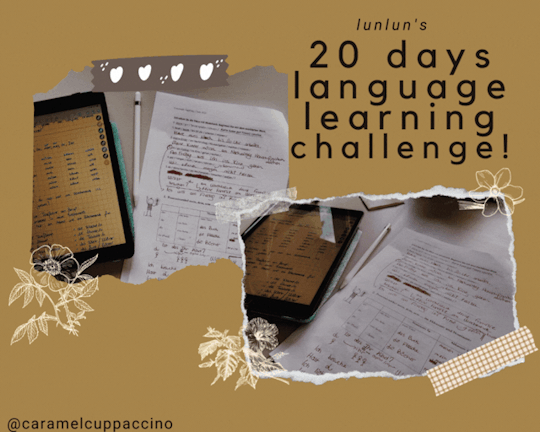
hi and hello everyone! my name is lunlun, i’m an english language teaching student. this is my last year. i’m learning german as my second foreign language. i’m now on my winter break and i want to motivate myself to learn german better during my break and do something besides duolingo. because i have around 25 days left before next semester begins, i decided to create a challenge for 20 days. i hope you will participate and this challenge will be useful and motivating for you too!
you don't need to do anything to participate. but i appreciate it if you reblog this post so that others can see the challenge. and do not forget to use the hashtag #languagelearningwithlunlun so that everyone can see your posts. good luck and i hope you have fun!
Day 1: Which languages can you speak besides your native language?
Day 2: Which language/s do you want to learn while doing this challenge?
Day 3: Are there any apps you use to learn languages?
Day 4: How do you improve your listening skills?
Day 5: How do you improve or practice your speaking skills?
Day 6: Are there any free online sources you use to learn languages? Please share<3
Day 7: Which language do you think is easier to learn: your native language or the foreign language you are learning?
Day 8: If you can speak English, where and how did you learn it?
Day 9: What is the biggest struggle of learning a language according to you?
Day 10: How do you enrich your vocabulary?
Day 11: Is there a certain method you use to learn languages?
Day 12: Which of the extinct languages would you like to learn if you could?
Day 13: How many languages are spoken in your country?
Day 14: Share an interesting fact about the language you are learning, or your native language.
Day 15: What is a misinformation about your native language or the language you are learning?
Day 16: Are there any words in your mother tongue that are borrowed or adapted from English or other languages?
Day 17: Briefly summarize what you’ve studied and learned today!
Day 18: What do you think about grammar? Is it fun to learn? Do you enjoy grammar activities? Does knowing your native language’s grammar help learning another language’s grammar?
Day 19: Do you know how many dialects your mother language has?
Day 20: The last day! Did you enjoy the challenge? Was it helpful?
#language learning#languagelearningwithlunlun#studying challenge#challenge#langblr#langbr#language challenge#study space#study hard#study#studying#studyblr#study blog
215 notes
·
View notes
Note
the eppy-toh-me pronunciation is a thing because that’s the greek pronunciation (it’s straight up a greek word) but even I whose native tongue is greek always said it like eppy-tome in english. The word tome by itself already exists in english and is Just Tome so why would epitome be pronounced like in Greek!!!!
and here we see perfectly illustrated the reason why English is such a headache 😩 there's so many influences in the English language (Latin, Greek, French, German, Saxon, etc) that people literally just took words from wherever and whatever stuck just stuck. you speak a sentence in English and every word comes from a different source. my linguist ass is fascinated but screaming constantly. English is a Frankenstein's monster of a language.
(for those curious, "epitome" comes from the Greek "epi" (in addition) and "temnein" (to cut), forming "epitemnein", meaning "to cut short" or "abridge". this then evolved into the Latin "epitome", with the same meaning, and then in the early 16th century it started to become used in its current form, as in a person or thing who embodies/typifies something.
"tome" is related the Greek "temnein", but comes directly from "tomos", meaning a section of something (like part of a piece of writing, a scroll, etc). so there's the link with "to cut", but it's got a different and more specific context. it then went to Latin and into French, where we get "tome". originally used to mean "part of" a wider work, modern usage seems to use it more to refer to a particularly large or old book ("the ancient tomes", or [slams Les Mis on the table, shattering it] "check out this tome").)
17 notes
·
View notes
Note
Any opinions on the idea of a "universal language" one that simplified and designed for mass global communication? Are there any languages that you think would be good for this? or do you think one would need to be tailor made?
Oh boi.

I’m not sure I’m ready for this can of worms to be opened, but I suppose in order to keep some level of intrigue, let’s crack it a bit and peek inside.
The short answer is: No. I don’t think a Universal language is possible on the scale that everyone dreams of.
People have tried, and although we have discovered that we are relatively good at inventing languages, getting people to use them, and use them in the way that WE want, is nigh on impossible. You think herding cats is hard? Try telling humans how to say words.
The long answer is:
Over the past 900 years, over 900 languages have been invented (source). Many of them have been invented with the explicit purpose of being a ‘universal’ language.
Thus far, none of them have succeeded.
I think if you’re ready to delve into this full throttle, my first recommendation would be a book called In The Land of Invented Languages by Arika Okrent. It goes into detail about how, why, and what languages humans have invented since.. well... forever. It also details what happens when we get close to succeeding in a Universal Language - and why we fail anyway.
One of the most obvious examples of this is, perhaps, Esperanto.
If you don’t know what Esperanto is, here’s a wiki link. The gist is that in 1887, a Polish eye doctor with big dreams of creating a universal second language which would be less convoluted than English and French, easy to learn, and easy to speak. His hope was that it would bridge the barriers between other languages, make something that would be capable of crossing cultural barriers. Perhaps world peace was in there, somewhere.
Here’s a sample for those interested:

And by all accounts, Esperanto has since then, grown into one of the most well-known constructed languages in the world! You can learn it online, they have annual conferences, and there have been parents who have taught their children Esperanto as a first language in an attempt to make it their native language!
However, despite its incredible success, Esperanto has not become a Universal Language in its 100 years of existence. Why?
Well, let’s go over some issues:
1) Despite the fact that it is advertised as a language that is ‘easy for anyone to learn’, it is still, at its core, a European language.
Esperanto draws heavily from Romance languages such as Spanish and French, has some features of Germanic languages (English and German) and minor contributions from Slavic and Greek. It uses the latin alphabet, which may seem pretty neutral.... if that’s your alphabet to begin with.
If your first language is not close to any of the above, Esperanto will be harder for you to learn. Its ‘universality’ is approximately what you would expect - not accounting for much of the world outside of the western one.
In fact, creating a truly ‘balanced’ language would be incredibly difficult because all the languages of the world ARE so varied. They all have their own grammar and rules, and these rules exist on a circular spectrum. There is no ‘middle ground’, and regardless of what you choose to make it, your language will be similar to one system or another, and it will inevitably be difficult for some people to learn.
2) A Universal Language must remain universally constant, but languages, inherently, change. What happens when Esperanto speakers start to develop dialects?
In fact, this has already happened to some degree. Due to Esperanto’s popularity, annual conferences are often filled with people from all over the world who converge only once a year after having spoken Esperanto with their own Esperanto community for the over 364 days.
What happens? They start to disagree and develop their own way of saying things, shortening words, adjusting grammar... you know, the stuff that MOST humans do with their own language.
We LOVE to have our own stuff. And as language is socially negotiated, every community of Esperanto speakers will come up with different solutions to the same problems. (See English speakers and their various way to specify a plural ‘you’ - ‘y’all’, ‘y’alls’, ‘yous’, ‘you guys’) What happens then is a natural evolution of Esperanto .... into different types of Esperanto.
Which - not bad, necessarily, but it is perhaps the opposite of what one might imagine for a single ‘Universal’ language.
3) You can lead a human to a language, but you cannot make them speak.
At its core, a Lingua Franca - a universal language - has to be something we CHOOSE to use universally.
Currently, the closest thing we have is English, because English is already THERE for many of us. It’s omnipresent even in countries where its got no reason being.
If every one of your friends is already using the same messaging app, you probably won’t have much energy to campaign for a different, less known but far ‘more useful’ app. You’re going to go to the app store and download the app, even if it’s buggy and has an annoying interface. It’s already there.
Anyway... this is all to say - a Universal language is probably possible, but only in the loosest sense of the word.
Inevitably, we would probably need a Universal language FAMILY. One that is varied to suit needs of the speakers, but is still mutually intelligible in order to promote communication without falling into the colonialist ‘You MUST learn THIS language and you MUST speak THIS language!’.
And honestly, very personally speaking... I like learning more languages. But I would be pissed if I was forced to learn a Universal one without proper support and consideration to what my native tongue was.
471 notes
·
View notes
Note
Hello, I’m Xiao (source: Genshin Impact). I’m currently looking for anyone really but specifically if I could find my Rex Lapis/Zhongli, Ganyu, Albedo, Aether (Aether was my Traveler in my canon but I’m also not opposed to meeting Lumine), Childe, and Sucrose that’d be amazing.
Memories: I’m pretty sure Childe and Zhongli were dating. Ganyu had more Qilin-like features (Horns like in source, blue/white scales mostly on her shoulders, arms, and legs. Both Adepti and The Seven had their own native tongues separate from the “normal” people of Teyvet (the Adepti language was called ‘Ädespi’ and Archon language was called ‘Archonon’). I had pretty thick accent from it (it was kinda like a Chinese accent but also not? It was weird but apparently Aether thought it sounded soothing), Albedo had a thick German-like accent. Rex Lapis taught me common/traditional Liyuean language but I was pretty hesitant to actually learn it. Sucrose also had a soft German-like accent
If any of this sounds (or you just wanna talk, you don’t have to be from my canon) please message on on here, or just reply to this post and I’ll be there
!!!!!!!!
11 notes
·
View notes
Note
Hello, I’m Xiao (source: Genshin Impact). I’m currently looking for anyone really but specifically if I could find my Rex Lapis/Zhongli, Ganyu, Albedo, Aether (Aether was my Traveler in my canon but I’m also not opposed to meeting Lumine), Childe, and Sucrose that’d be amazing.
Memories: I’m pretty sure Childe and Zhongli were dating. Ganyu had more Qilin-like features (Horns like in source, blue/white scales mostly on her shoulders, arms, and legs. Both Adepti and The Seven had their own native tongues separate from the “normal” people of Teyvet (the Adepti language was called ‘Ädespi’ and Archon language was called ‘Archonon’). I had pretty thick accent from it (it was kinda like a Chinese accent but also not? It was weird but apparently Aether thought it sounded soothing), Albedo had a thick German-like accent. Rex Lapis taught me common/traditional Liyuean language but I was pretty hesitant to actually learn it. Sucrose also had a soft German-like accent
If any of this sounds (or you just wanna talk, you don’t have to be from my canon) please message on on here, or just reply to this post and I’ll be there
!!!
9 notes
·
View notes
Photo

Ack apologies for the lateness, cheesepost going over the choices for all the Tamriel cheeses is here! As before, explanations are under the cut!
High Rock: I tend to default to finding inspiration for High Rock cuisine in French cuisine, for reasons I’m not really able to explain other than “it just feels right” (which is consistent with how I handled High Rock’s bread, haha) Thus, High Rock’s cheese is based on French blue cheese (bleu d’auvergne, specifically). Blue cheese tends to be pretty strong in flavor and odor, and since “strong/good flavor” was a theme I went with for the breads (in that case, having very sweet and buttery breads) so I thought it fit High Rock well in that regard too!
Hammerfell: Hammerfell’s cheese being goat cheese is based entirely off the headcanon that goats are the most common livestock kept there. I just remember from my time in ESO that there were many, many goats out in the wilderness of the Alik’r desert, so I felt goat’s cheese was fitting (though it is certainly a headcanon I could just be misinformed on!)
Wrothgar: This cheese is based directly off of “drunken cheese”, which is when the cheese is soaked in wine for flavoring, hence the outer wax binding being a deep reddish purple. For this one, I did stick to it being soaked in wine because the purplish binding made it stand out better from the other cheeses, though I’d imagine orcs would prefer to use something stronger, like a hearty ale to soak their cheeses in!
Skyrim: Though Skyrim has a few in-game canon cheeses already, I wanted to make something outside of canon, so I went with a cheese made from sheep’s milk! This was actually taken from a comment from @theshotgunsailor here!

Who is absolutely right, there should’ve been sheep in Skyrim! (I understand the canon that Nords are pretty cold resistant so might not be able to raise sheep, but think of all the other races who live in Skyrim! Wool products would certainly be popular enough to encourage farmers all across the land to raise sheep for wool!)
Er, not to derail cheeseposting into clothesposting, but I liked the headcnon, so I used it!
Morrowind: “Cheese” in Morrowind is of course scuttle! I answered an ask about what scuttle is here, but for those wanting a more condensed description, it’s a “cheese-like” food made from mashed beetle flesh (similarly, I’d imagine, to how scrib jelly is just mashed scrib). It is also described as being greasy, hence the...shininess, which has the unfortunate side effect of looking like something far less appetizing, what with the brown coloring... But who knows, it is referred to as a popular dish, so maybe it doesn’t taste that bad!
Black Marsh: Another cheese I’ve answered an ask about here, but it is essentially mite cheese! That is, it’s based on a german cheese called milbenkäse, which is a cheese flavored by, uh...the excrement of mites who eat the cheese; the mites are also eaten with the cheese, from what I’ve read... Sometimes I parallel Tamriel foods with irl countries/cultures that parallel said province, though that wasn’t the case here, since I’m not sure how many similarities Black Marsh and Germany have, haha. I’ve just read from the A Culinary Adventure series of lorebooks that Argonian cuisine commonly uses insects in their dishes, so figured mite cheese was a perfect fit for them.
Valenwood: This one might’ve caused a bit of confusion with it being slightly tongue-in-cheek, but Valenwood cheese isn’t so much a specific specialty cheese as it is thin slices of cheese wrapped around slices of cold meats, since meat is of course a very favored part of a bosmer’s diet. I think they’re technically just called dried meat snack rolls, and the specificity of what kind of meat/what kind of cheese is used isn’t important to the “dish”. Either way, it looks like this lasdfjs

Elsweyr: Elsweyr cheese is based on a smoked polish cheese called oscypek! The shape and color varies, though I referenced off of these!

The choice for this one wasn’t too deep, I just felt ornate and decadent design fit very well with Khajiits, as well as the shapes being suitable for portability (a lot of headcanons I have for Khajiits come from Beyond Skyrim: Elsweyr stuff, which includes items meant for nomadic Khajiits--thus, travel-friendly cheeses!)
Summerset: Summerset cheese is a soft imported cheese lavished with many fancy herbs and spices, as the typical direction I like to go in with Summerset foods is “this must scream decadence”. It being a soft cheese, it’d be eaten more as a spread you’d put on fancy crackers and breads at teatime, though I don’t see why one can’t eat the cheese on its own!
Cyrodiil: Cheese in Cyrodiil wasn’t headcanonned too fancily, as I have a blanket hc with all foods in Cyrodiil being at least somewhat sourced/inspired from other provinces’ cuisine due to the Imperial City being the capital of Tamriel, thus being a large cultural hub. For native Cyrodiil cheese, I just went with a basic swill-like cheese since it closely resembles Oblivion’s in game cheese model. Just you’re standard cheese made from cow’s milk, though still tasty nonetheless!
Shivering Isles: Though the Shivering Cheese and Olroy cheese weren’t officially labelled as from the Shivering Isles (nor can I speak too much on it as I’ve not played Shivering Isles) I’d imagine they’re at least in some parts a strange creation from a certain jolly prince.... (Olroy, from what I understand, being a cheese used in his daedric quest in Oblivion, and the Shivering Cheese being from ESO, though my understanding of both games are sadly limited ^^;)
#the elder scrolls#tes#morrowind#skyrim#foodposting#cheese#ches time...#also apologies for the lateness aljsdfljs
178 notes
·
View notes
Text
2090 Pt. 1

Hi. This post here is a short story written by me. My native tongue is german, which can lead to possible grammatical errors. Sorry in advance. There are two more short storys set in the same universe, that I will upload shortly after this one. Have fun reading and please feel free to leave any kind of constructive criticism.
Part one - Part two - Part three
Looking out the window and seeing… nothing. The smog in the air is so dense that I can't even see the sun clearly. "Kristyn we're going to be late. Hurry up! We have to get to the town hall before 12!". I sigh and get up. The big flood caused my mom and me to lose our home. We used to live in a small city on the coast of Florida. But we were lucky. We found a new home in Dallas. Now we just have to get registered. Before I go out of my room, I take my medicine, as always. I have to fight against my cancer somehow, you know? I don't want to die like my father did. I go to my mom who is waiting for me by the door. I quickly slip on my jacket and my shoes and I put on my mask. Nobody goes out without a mask nowadays. We walk through the little garden in front of our house and look at the little thing that is painted on our mailbox. It's a white bear going on all fours on a tiny iceberg. My mom says it's a polar bear. I've never seen one and neither has she. They died out years ago.
Both of us get in the car. My mom is in the driverseat and I sit next to her. My moms small figure is looking weird behind the steering wheel even though she was an excellent driver back in the day. My mom starts the engine and the car starts to drive on it's own. We start driving from the outskirts of the city to the center of Dallas. Our car is one of the older hydrogen models but it works just fine.
While my sight is just swerving around the car and the scenery that we're passing by I am beginning to think. So much has happened in the past decades and mostly because of climate change. The polar caps have almost been melted, due to the whole world warming up, and because of that the water level started to rise. Floods were occuring more and more, getting bigger and bigger everytime and islands started to vanish from the world's surface. It's like they got erased with just a snap of two fingers.The countries that thought that they wouldn't get flooded got flooded. The once beautiful Caribbean islands aren't existent anymore and you can only see the volcanoes of Hawaii. The rest is under water. The Netherlands are under water as well and a huge amount of Germany too. The continents becoming islands, caused the rate of homeless people to skyrocket and the world leaders to worry even more. Speaking of them, the politicians have finally realised that climate change is indeed real. Even the people that totally denied it.*cough* like republican politicians *cough*. I'm assuming they "realised" it because the fossil fuels died out and they lost their best money source. Their best money sources were of course their stocks in coal and oil. Even though the extinction of the fossil fuels was a good thing, because they emitted most of the carbon dioxide, it still wasn’t enough to stop the ongoing climate change.
As I'm looking out of the car window, I can see almost no trees anymore. Because of the deforrestation and the huge forrest fires, there is basically no wood left. The whole landscape went bald. Now the free land is used for windmills, because that's the only source we can get our energy from. But it's honestly way too late to make these windmills our main energy source. We should have done that years ago, when there still was a bit of hope to help our planet. When there still were possibilities to change at least something. When there still were people who actively fought against climate change.
We are now in downtown Dallas, almost at our destination. The people outside look power- and emotionless, they have blank looks on their faces and most of them don't have hair anymore. Because of the carbon dioxide we were emitting, the ozone layer got tremendously destroyed and that highered the chances of getting cancer, because the sunlight couldn't get filtered anymore. This led to many people getting cancer. The state that the world was in didn't help at all to cheer the people up. Everyone fell into a depression. It seems like a dark tunnel without a ray of sunshine at the end of it, for them. They fell into a big hole of nothing with nobody to help them get out or a plan to escape it. Along with depression everyone feared that their life would just end tomorrow, maybe because of a big flood while they were asleep or because of a lung disease due to the smog. They basically got anxiety as well. Everyone was fighting from one day to the other, not caring about anyone else. They became egoistic and got angry easier, as if their life depended on that package of toilet paper, that they were currently fighting over like cavemen. The whole society got messed up.
The car came to a halt. We are standing at a traffic light two minutes away from the town hall. Suddenly the car is starting to move even though the traffic light is still red. I am looking to my side and see my mom helplessly trying to stop the car which is speeding into the ongoing traffic directly into another car. In panic I am trying to shield myself with my arms as our car is colliding with the other one. I am hearing a horrible crash sound and I am starting to scream. I am feeling like I'm being flipped around and I can feel pain rushing through my right arm. I close my eyes, not wanting to see anything. I am getting pushed into the already popped out airbag. The last thing I hear before everything goes quiet is a loud 'Boom' and I feel heat rising all around me.
Everything around me is black. I am looking down and seeing my body. Ok so my soul hasn't left my body yet. My vision is starting to get blurry and when it's starting to clear up I am astonished. I'm standing on a breathtaking forrest clearing. All around me are big and strong trees and the sunlight is seeping through their leaves. It looks like golden threads are sewn through this wonderful scenery. It almost looks like a work of art, no, it is a work of art. I lay down on the grass and look up to a sky colored in the most vibrant kind of blue with clouds that look like fluffy cotton candy. I breathe in the clear air around me, close my eyes and let the sun tickle my skin.
Opening my eyes again I'm standing in a busy city. There are hydrogen cars everywhere and smog is nowhere to be seen. The people around me have smiles on their faces and almost seem to be careless. Everyone has beautiful hair styled to perfection, not a bald head from chemo therapy, and they all look totally healthy. I'm starting to think that I want to live here so badly. This is the life the world should live, the life everyone wants to live, the life that we could've had. I am suddenly hearing my name beeing called. I turn around to see my mom just a few steps away from me. Between us, just a pedestrian crossing. "Sweetie, come over here!! We can get coffee to celebrate that we just moved in our new home here. You were right, it is so beautiful here." I smile at her just because of the fact that she said that we live here now. We will live in this clean city with beautiful and happy people, with clean air and a clear sky and with trees on the sides of the street. My mom is calling my name again and winking me over to her. I am starting to walk but I speed up my walk, so that I am almost running. I can't wait to be able to live here. I can finally live without worrying for our planets future and mine, to finally get healthy again and to finally live happily. I am rushing over the pedestrian crossing and almost jump into my moms arms that are widely spread for a giant hug. I am hugging my mom tightly like she is hugging me. We are reunited again like the old times, when everything seemed to be perfect and we all lived a relaxed and quiet life...
A long "beep" is echoing through the intensive care unit of a hospital in Dallas. A doctor and a nurse come rushing in to check where this very familiar sound is coming from. Finding the source they sigh. The world has lost another soul. The heart rate monitor of a young girl in her teenage years has gone to zero. "It was just a matter of time until it happened. It's sad that she died this young, eventhough it is 'common' in today's state of living.", the doctor said. As he jotted down the time of death on his clipboard the nurse is nodding. "Yes you're right sir. I think that it's just kind of weird that she died in a car crash. I mean the cars are driving themselves, so how could that possibly have happened?...". The room is filling with silence, both of them trying to figure out how this girl died in such an unusual way.
#short story#writerscorner#writing#fantasy#dystopic#dystopia#climate change#climate catastrophe#activist#climate activism#english#creative writing
2 notes
·
View notes
Text
Sorry, more research dumping from the Letters:
As Minas Tirith is at the source of C. Speech it is to C.S. as London is to modern English, and the standard of comparison! None of its inhabitants should have an 'accent' in terms of vowels &c. The Rohirrim no doubt (as our ancient English ancestors in a similar state of culture and society) spoke, at least their own tongue, with a slower tempo and more sonorous articulation, than modern 'urbans'. But I think it is safe to represent them when using C. S., as they practically always do (for obvious reasons) as speaking the best M[inas] T[irith]. Possibly a little too good, as it would be a learned language, somewhat slower and more careful than a native's. But that is a nicety safely neglected, and not always true: Théoden was born in Gondor and C.S. was the domestic language of the Golden Hall in his father's day (Return of the King p. 350). [Letter 193]
Taking from this: Éowyn is basically like those Germans who speak fluent English, French, and god knows what else, and are constantly like "Oh, I'm so sorry for my poor language skills," after delivering a flawless spoken dissertation in their second or third language lol
#for later#presumably éowyn speaks: 1. the rohirric language 2. westron 3. sindarin#and that's by the time we reach her in TT#which is a straight dunk on faramir who probably speaks: 1. sindarin 2. westron 3. quenya (but as academics do latin)#she is therefore the more interesting and useful polyglot of the house#hmmmmmmm#and also given the rohir oral culture she probably has better language acquisition/recall skills generally#which is getting the wheels turning in my brain: what is éowyn ends up learning a whole BUNCH of languages in the FO#and acts as one of the stronger formal translators in both ithilien and MT?#or if not a formal translator as a role at least negating the need to have translators around All the time during meetings or whatever#which would no doubt be....a pretty significant political benefit#oh man#fascinating
5 notes
·
View notes
Note
Hello, I’m Xiao (source: Genshin Impact). I’m currently looking for anyone really but specifically if I could find my Rex Lapis/Zhongli, Ganyu, Albedo, Aether (Aether was my Traveler in my canon but I’m also not opposed to meeting Lumine), Childe, and Sucrose that’d be amazing.
Memories: I’m pretty sure Childe and Zhongli were dating. Ganyu had more Qilin-like features (Horns like in source, blue/white scales mostly on her shoulders, arms, and legs. Both Adepti and The Seven had their own native tongues separate from the “normal” people of Teyvet (the Adepti language was called ‘Ädespi’ and Archon language was called ‘Archonon’). I had pretty thick accent from it (it was kinda like a Chinese accent but also not? It was weird but apparently Aether thought it sounded soothing), Albedo had a thick German-like accent. Rex Lapis taught me common/traditional Liyuean language but I was pretty hesitant to actually learn it. Sucrose also had a soft German-like accent
If any of this sounds (or you just wanna talk, you don’t have to be from my canon) please message on on here, or just reply to this post and I’ll be there
🎧
4 notes
·
View notes
Text
Mediterranean Medley: The Jewish Community of Tunisia
Tunisia is currently making global headlines. A decade ago the Tunisian protest for democracy sparked the “Arab Spring”, which led to vast political shifts in the Middle East. Now, its citizens are fighting to retain their past achievements and curb the ruler's authoritarian pursuits.
The recent events in this small country on the southern shore of the Mediterranean also provide an opportunity to discuss its Jewish community, a community small in numbers yet incredibly diverse in terms of socio-economic status and cultural orientation. This entry is therefore dedicated to exploring the complex history of the community, including the particularly tragic chapter of the Nazi occupation during the Second World War. As always fiction and culinary elements will be weaved into the discussion.
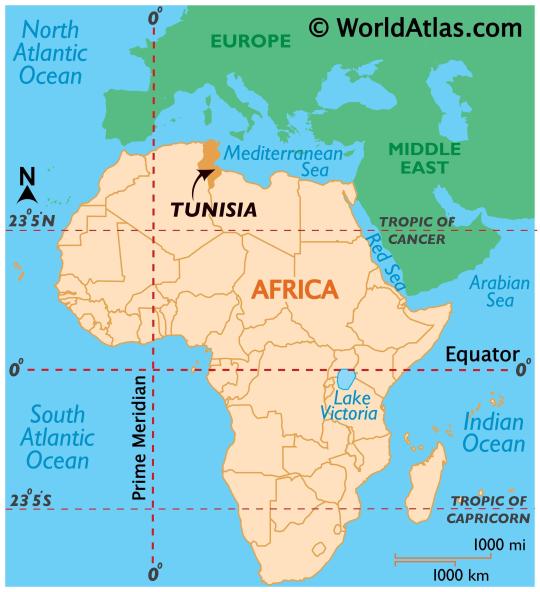
(Tunisia on the map: between Africa and Europe)
Berber, Italian and French Mix
The Jewish community of Tunisia settled mostly in the coastal areas in the cities of Tunis, Sousse, Sfax, Bizerte and Monastir. There were also several rural Berber communities, in which Jews lived a semi-nomadic life.

(The beautiful coast)
The origin of the Jewish community is disputable. Members of the community claim the first settlers migrated from Jerusalem after the destruction of the second temple in 70 CE. Several scholars, however, ascertain that the community originated from the conversion of either Phoenicians or Berber tribes.
Origin aside, archeologists indicate a viable Jewish presence beginning in the fourth century CE. Evidence also shows connection between Tunisian Jews and Jewries in Persia, Israel and Iraq. The Bagdadi community and its Talmudic centers, in particular, was a source of inspiration fueling the local Torah learning, and overall intellectual life.
In the fifteenth century, Andalusian Jews found refuge in Tunisia while escaping the Spanish Inquisition. Their influence is notable in architecture, culture, and clearly cuisine. Another wave of Jewish immigrants arrived to Tunisia from the Italian port city Livorno during the sixteenth and seventeenth centuries. The Livornese Jews, mostly Portuguse Marrano descendants, built maritime trade between North African hubs to European Mediterranean port cities. In 1741, the Livornese community (also called “Grana”) asked for autonomy on the pretext of having a different liturgy. Followed by this act, two separate communities- native and Livornese- were formed. The two sub-communities had their own rabbis, synagogues, cemeteries and philanthropies. The Livornese section, which actually encompassed all European Jews whether they came from Italy, France, Gibraltar or Malta- prided themselves as superior. They refrained from intermarrige with the native Jews, refused to speak Judeo-Spanish and continued speaking Italian. Some of the Livornese became rich bankers and merchants, but many were weavers, tailors, shoemakers, and even lived in poverty relying on charities.
In the cities, since Medieval times, the indegenous Tunisian Jews, lived in the margins of the Muslim areas and the Souks, in quaters named Haras. The Haras became overpopulated starting in the second half of the nineteenth century with poor sanitary conditions, and no running water nor electricity. The residents of the Hara were mostly craftsmen- tailors, potters, leatherworkers and silversmiths. Those who could afford it, left the Hara to settle in the European quarters built by the French.
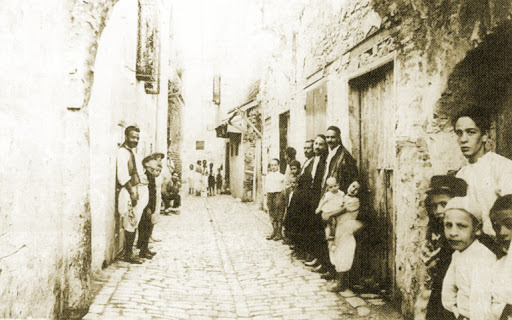
(The Hara of Tunis, image #1)
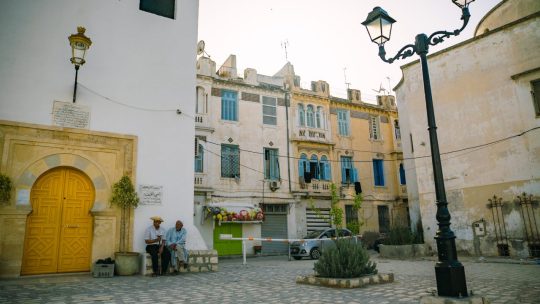
(The Hara of Tunis, image #2)
The French Colonization, starting in the late nineteenth century, created a new elite of Francophones. The upper Jewish class eagerly fostered French as their mother tongue, named their children in French names and sent their children to schools in Paris. The few, who managed to obtain key posts in the new colonial governments, were granted French citizenship, but the majority including some of the wealthiest families remained with the status of subjects.

(The French Quarter of Tunis)
Despite the strong French influence, Tunisia continued to be fairly diverse as a port country luring people from different parts of the Mediterranean basin. Thus, the Jewish population (unlike their brothers in neighboring Algeria) lived in a multicultural environment, in which Greeks, Maltese, Italians and of course Arabs co-existed and influenced one another.
A Boy in a Ruthless City: The Nazi Occupation through the Eyes of an Adolecent
The cosmopolitan climate described above was the setting of Albert Memmi’s (1920-2020) semi-autobiographical novel, The Pillar of Salt. In the book, Memmi, a distinguished philosopher known for his work on Colonial Studies, disguised himself as Alexandre Mordekhai Bennillouche, a poor Jewish boy growing up in the Hara of the capital, Tunis.
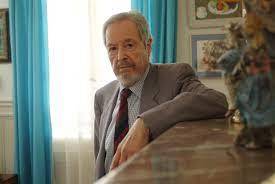
( Albert Memmi)
Bennillouche (or Memmi) begins his account in describing his happy childhood as an age of innocence and unawareness to his poverty and inferior status as a “native Jew”. Gradually, the protagonist discovers the world around him. He excels at school, but suffers from anti-Jewish violence from Chirsitan and Muslim peers. Given his academic performance, he is given a stipend to study in one of the city’s top schools, where he is introduced to the upper circles of the Jewish community and the general European society. This exposure causes a rift in the relationship with his parents, who resent his education wishing for him to continue the family leather business. Although deeply ashamed of his parents - their meager existence and traditional views- Bennillouche is quickly disillusioned from the enchantment of the elite. Being a critical thinker, he spots its insincerity and snobbery, yet he is forced to hide his contempt as he is dependent on their funds for his schooling.

(The capital- Tunis)
The six month Nazi occupation of Tunisia (November 1942- May 1943) reaffirms Bennillouche’s beliefs about the hypocrisy of the elite. During the short- yet traumatic - German presence, Tunisian Jews were subject to constant harassment from the occupiers and general population, and were under the imminent threat of being deported to the death camps in Europe. Yet, the degree of Jewish misery varied based on socio-economic belonging. When the Germans issued a decree for Jewish forced labor, the wealthy ones of the community paid ransom to exempt themselves and their dear ones. Impoverished men- however- were destined to greater hardship.
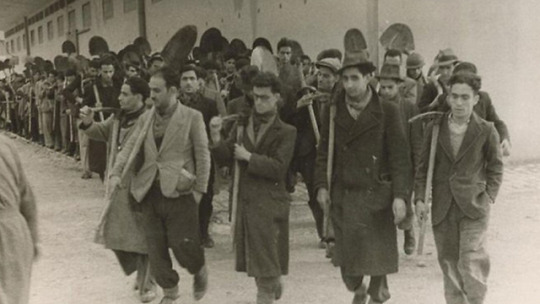
(Jews assigned for forced labor)
Benillouche (and Memmi himself) was one of the unfortunate people. Despite being friendly with people in high places, and holding a prestigious teaching position, he was deported to a concentration camp in the Saharan desert. There, he suffered from the brutality of the guards, the senseless work, and above all the merciless sun. However, camp was also a place of revelation. The hardship created a sense of comradery between Benillouche and his fellow inmates, of whom he shared similar upbringing. He was even reunited with some old friends, and enjoyed conversing with them in his childhood dialect of Judeo- Arabic, which he neglected in favor of French. In addition, the camp helped him to rediscover and reconnect to his Jewish roots, as he was asked to lead Shabbat prayers as the camp’s intellectual figure.
By the time the camp was released by the Allies, Bennilouche was a more grounded man. He still continued to march according to his original trajectory in the academic world but with a wiser outlook on life.
Topped with Harissa: A Quick Peek to Jewish-Tunisian Cuisine
Even while estranged from his family traditions, Bennilouche always maintained a fondness for his mom’s traditional Tunisian cooking. In fact, he recounts nostalgically the smells of Shabbat dishes cooking slowly in the tiny kitchen of his childhood home. When he matures, he recognizes the power of food as a source of comfort and festivity in a household that is poor and filthy. One of the dishes he highlights is Bkeila (also pronounced Pkeila) - a hearty spinach and beans stew served vegetarian or with beef. Below is Yotam Ottolenghi’s take on it from his latest cookbook Flavor.
Bkeila, Potato and Butter bean Stew - Adapted from Flavor
(See my notes below to simplify the cooking process)
4 cups (80 gram), roughly chopped cilantro
1 ½ cups (30 gram) parsley
14 cups (600 gram) spinach
½ cup (120 ml) olive oil
1 onion (150 gram), finely chopped
5 garlic cloves, crushed
2 green chiles, finely chopped and seeded
1 tbsp plus 1 tsp ground cumin
1 tbsp ground coriander
¾ tsp ground cinnamon
1 ½ tsp superfine sugar
2 lemons: juice to get 2 tbsp and cut the remainder into wedges
1 qt/ 1L vegetable/ chicken stock
Table salt
1 Ib 2 oz/ 500 gram waxy potatoes, peeled and cut into 1 ¼ inch pieces
1 Ib 9 oz/ 700 gram jar or can of butter beans, drained
1.In batches, put cilantro, parsley and spinach in a food processor until finely chopped. Set aside.

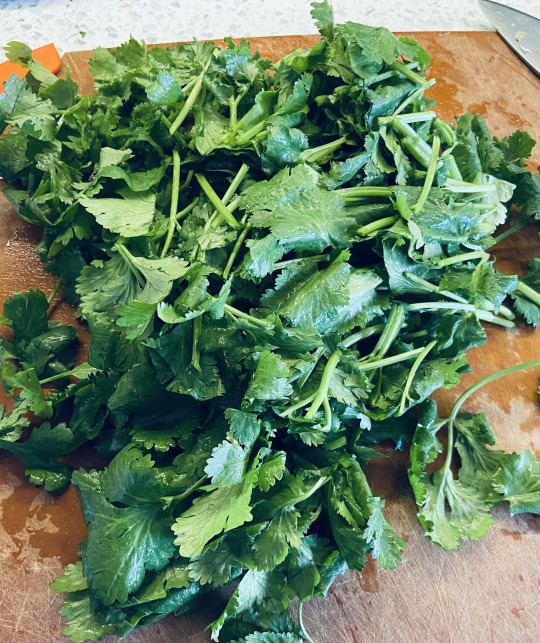
(Massive amounts of greens)
2.Put 5 tbsp of olive oil into a large heavy-bottomed pot on medium heat. Add the onion and fry until soft and golden, mixing occasionally (about 8 minutes). Add garlic, chillies and all the spices and cook for another 6 minutes, stirring often.
3.Increase the heat to high and add the chopped herbs and spinach to the pot along with the remaining 3 tbsp olive oil. Cook for 10 minutes, stirring occasionally until the spinach turns a dark green. The spinach should turn a little fried brown but not burn. Stir in the sugar, lemon juice, stalk and 2 tsp salt. Scrape the bottom of the pot if needed. Bring to a simmer, then decrease heat to medium and add the potatoes. Cook until they are soft for about 20-25 minutes and then add the butter beans and cook 5 minutes longer.*
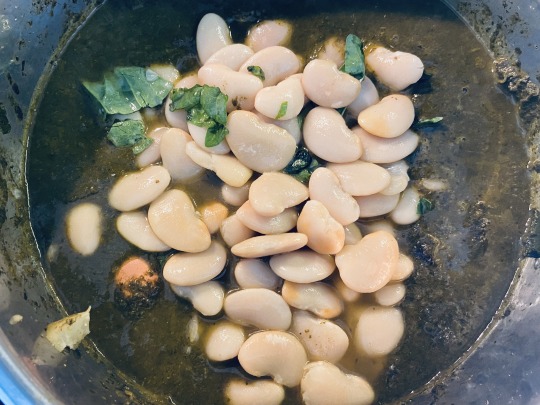
(Butter beans to break the deep green)
4.Divide into bowls and serve with lemon wedges.**
* As this dish was traditionally slow cooked using a slow cooker pot or a pressure cooker could easily do the trick. If using these- do the following: Skip step 1. Saute the onions, garlic, chilli and species as instructed in step 2. Then add the rinsed spinach and herbs. Mix them well with the onions and spices in the bottom. Once the spinach begins to melt, mash them using a hand blender and then add the ingredients described in step 3 (beside the butter beans). Then let it slowly cook until everything softens. In the end, add the butter beans and press on the “stay warm” button.

(loading the pot with spinach)
** I served it with bulgur to soak up the liquids a bit (rice, farro or any other grain will work as well). I also added hard boiled eggs for additional protein.

(Healthy and heart)
In addition to the Bkeila- The Tunisian Shabbat table will not be complete without the famous couscous. The process of making it from scratch without a food processor was quite laborious, but the result - whether served sweet with nuts and spices, or savory with meat stew or fish - was considered a delicacy.
The proximity to the Mediterranean shore brought fish dishes to the Jewish- Tunisian repertoire. Fish is mostly eaten fried or cooked as fish balls or oven roasted served with red hot sauce. Meat is also often served spicy, and often chunks of hot merguez sausage are added to stews or shakshuka.
Generally speaking, Tunisian Jews are fond of hot flavors, and their cuisine is potentially the spiciest in the diaspora (perhaps only second to the Yemeni). Harissa paste, now increasingly popular around the world - is liberally used to spice up any dish. This fiery red pepper condiment is added - for example- to the famous Tunisian fricassee, one of Israel's most popular street foods. Click here for a recipe for this tuna loaded sandwich, and here to learn more broadly about Tunisian cuisine.

(Tunisian Sandwich with some Harissa)
8 notes
·
View notes
Text
"Where the fuck are you from??"
So this is a very very petty revenge. To set the scene, I live in a small European country, and the older generations here can sometimes be incredibly xenophobic, which I really loathe. I am a linguist, and my husband is pretty into languages as well, we like to speak different languages together for fun and practice.
So about 3 years ago we were going home from an event (a theatre visit I think), which had us a bit dressed up, think tux and a long dress. We were on the subway, because parking in the downtown is hard and at that time of the day it was faster than a cab when I notice a total Karen with her husband sitting down right across from us. She immediately gave us a look, apparently disturbed by our attire. My husband kept on talking to me, and in a moment I hear then Karen go "Can you see them? Showing off their money! Fuckin Russians!"
This made no bloody sense, like what? I nudge my hubby to pay attention to them. Her husband gives a sigh and reacts "Honey, calm down, and I don't think they're speaking Russian." "Of course they are! Listen!"
On cue, I switch language, and hubby follows. We end up keeping the conversation alternating all the languages we can manage (Spanish, Italian, French, German, Japanese, some Serbian and of course English). I can see the pair listening with raising frustration, quarreling about us the whole time. After about 3 more stops we get up and get off the train. The Karen actually gets up and yells after us "Where the Fuck are you FRom!"
We smile and wave, and my husband shouts back in our native tongue, "Locals! Have a nice evening!"
Source: reddit.com/r/pettyrevenge
97 notes
·
View notes
Note
okay i couldn’t narrow these down, so you can totally pick which ones you want to answer, but for the character solidifying: 10, 12, 29, 32, and 49 for yeong-hui!!
Character Solidifying // Accepting!

Me, answering all of these anyway bc they need development and also bc I love you and your curiosity about my characters:

10. Is your character street-smart, book-smart, intelligent, intellectual, slow-witted?
Yeong-Hui’s intelligence is... hard to define. I’ll get more into the reason in the next question, but Yeong-Hui is mostly more emotionally and linguistically intelligent than anything else - one of the precious few traits they share with Garis. Emotionally intelligent, in that they can understand and empathise with peoples’ emotions very easily, and if they put effort into doing so, can understand peoples’ motivations and intentions quite easily. Linguistically intelligent, in that they’re not only poetic and silver-tongued, but also have a keen faculty for learning new languages. Though Yeong-Hui themself only speaks Korean, English, and Mandarin, Garis can speak those three as well as Swedish, French, Spanish, German, and Japanese.
12. How does their education and intelligence �� or lack thereof - reflect in their speech pattern, vocabulary, and pronunciations?
Yeong-Hui’s education is a complex matter - most of it took place when Iris fronted for what would become their system, so Yeong-Hui has no direct memory of it. Only the essential knowledge such as some languages, basic math, English, and home economics, were willingly transferred to Yeong-Hui once they became the host again. As a result of this, Yeong-Hui mostly takes their speech patterns from the kinds of people they associate with, rather than any formal ‘education’. Their vocabulary in day-to-day conversation is therefore rather basic and laid-back, mostly crutching on contractions and slang to get through a conversation - but they do know how to use much more flowery language when they turn on the charm, or when they want to write a poem for someone, for instance.
29. What is your character’s weaknesses? Hubris? Pride? Controlling?
Yeong-Hui’s main weakness is that they’re too self-absorbed, and too nonchalant about, well... everything, except for the things that they can be convinced to care about. This isn’t rooted in apathy, however - it’s more a result of a narrow, self-serving approach to life. If someone is in need, they’ll still do everything they can to help - it’s just that they’ll be more inclined to help if it benefits them in some way. This isn’t always the case, obviously - a huge part of their reputation as a model consists of their charitable donations towards homeless shelters and medical research - but it certainly is more of a motivating factor for them. And, as with some of their relationships, they end up being prone to stepping on other people, inadvertently or not, to rise above their own station.
32. How does your character react to stress situations? Defensively? Aggressively? Evasively?
Yeong-Hui mostly tends to be avoidant of any kind of stress in their life - if anything, it mostly feeds into and roots from their attitude as outlined in the previous question - they firmly believe that nothing in their life is permanent, and the quicker something that no longer affects them is forgotten about, the better. Of course, there are times where they just can’t avoid stress, whether it’s thrust upon them, whether it haunts them in the middle of the night, or in the rare occasion they find themselves in a life-threatening situation. In either case, they’re very much prone to receding into a dissociative state - which is when Garis is more likely to emerge out of defense for the system they don’t know exists.
If that happens, of course, Yeong-Hui retains none of the memories of it - and if it’s been dealt with and they wake up back at their apartment without explanation, they don’t deign to question it. They just move on, and try to forget it ever happened - whatever ‘it’ may have been.
49. What about voice? Pitch? Strength? Tempo and rhythm of speech? Pronunciation? Accent?
I hate this question because I only just recently came across a decent singing voice reference for Yeong-Hui but it’s from a fucking bingus video bc I can’t find the original audio source... here it is but god. god dammit.
For a more written description - when speaking normally, their voice is quite thin rather than strong, but with a moderately low pitch. However, they do not speak flatly at all most of the time - while their resonance is mostly consistent, their pitch fluctuates wildly, especially when they’re in public or talking at length about something they like, or something that’s interesting to them. They’re also prone to letting vowels ‘hang’ for a bit -- for lack of a better term what I mean by this is that they often say words like “so” as “sooooooooo” in conversation - letting it drag out for a second or two for emphasis.
As for accent, this is once again a product of their associates, and they take on a slight American drawl to their accent when they’re speaking English. Sometimes they end sentences or words slightly abruptly, taking from Korean and Chinese pronunciation structure, but this mostly only occurs when they’re speaking to either another native speaker, or when they’re generally more relaxed - otherwise, they seemingly make a purposeful effort to drag out vowel sounds and word endings in public, or with strangers.
#pinevalley#[𝒮𝒽𝑒 𝓈𝒶𝒾𝒹 𝐼'𝓁𝓁 𝓁𝑜𝓋𝑒 𝓎𝑜𝓊 '𝓉𝒾𝓁 𝓉𝒽𝑒 𝒹𝒶𝓎 𝓉𝒽𝒶𝓉 𝐼 𝒹𝒾𝑒] Yeong-Hui;; Headcanon#[Ask And You Shall Receive] Ask Meme#save;;#{ G O D... }#{ laura u rly put me thru the grinder huh }#{ but thank u for these!! }#{ i had a blast writing them!!!! }
7 notes
·
View notes
Text
About
Why are you doing this?
I love the Ace Attorney games, but I was immediately put off by the Americanisms in the very clearly Japanese games when I first started playing. I’m super late to the franchise—like two decades late. I started with the trilogy Switch port, so the localization felt really old-fashioned to me. Like a lot of fans, I grew to sort of appreciate the wacky nature of the localization, but this blog scratches a deep itch I have to see un-localized Ace Attorney content and have a glimpse at what a more “faithful” translation could look like.
Where did you get your scripts?
I got the scripts from this post by Jozerick on Court-Records. They are from the DS and 3DS versions of the games and so differ from the Switch (and other) ports of the first three games.
Do you hate the localization?
Actually, no! I have a lot of respect for the work the localization teams have done over the years. My main problem with the decision to move the English version of the game to the States is, of course, the resulting cultural erasure of a lot of Japanese elements. Translation and localization practices have been changing gradually, but dramatically, since the ’90s, especially when it comes to Asian media being adapted for Western audiences. Translation and localization teams are getting more and more comfortable with source-oriented translation practices. I’d like to think that if Gyakuten Saiban had come out in 2010, the American and European versions would have looked a lot different. At the same time, I get why they did it—if you keep the setting in Japan, you can’t have names like “Phoenix Wright” and “Miles Edgeworth,” but then the many many word game jokes like Naruhodou/naruhodo are totally lost on non-Japanese speakers, or you have to spend a lot of time explaining those jokes in a way that might totally take your audience out of the world of the game.
To prove that I actually think some elements of the localization are excellent, here are some great jokes that are unique to the English versions of the games.
(Plus, I will never get tired of fake German Klavier randomly saying “Achtung, baby!”)

How good is your Japanese?
Bad. But I’m learning! I have degrees in linguistics and translation, but English (US) is my native tongue. I have advanced knowledge of German and French, as well as some background in Mandarin, Korean, and Spanish. I rely heavily on Google Translate, Jisho, and translations done by others for my analyses. So of course if you notice any mistakes in my translations or analyses, please point them out to me!
#faq#jozerick#if you wanna be friends and/or talk language and/or ace attorney#come find me at my main @percydew
5 notes
·
View notes
Text
Remembered with gratitude and love

My grandfather, serving in Germany during World War I. Born in Kentucky, he was a fluent German speaker, so after the war, Grandpa had to stay two more years in Germany to serve as a translator.
Grandpa participated in the famous Christmas in the Trenches truce. If you do not know the story, here it is:
During World War I, on and around Christmas Day 1914, the sounds of rifles firing and shells exploding faded in a number of places along the Western Front in favor of holiday celebrations in the trenches and gestures of goodwill between enemies.
On December 7, 1914, Pope Benedict XV suggested a temporary hiatus of the war for the celebration of Christmas. The warring countries refused to create any official cease-fire, but on Christmas the soldiers in the trenches declared their own unofficial truce.
Starting on Christmas Eve, many German and British troops sang Christmas carols to each other across the lines, and at certain points the Allied soldiers even heard brass bands joining the Germans in their joyous singing.
At the first light of dawn on Christmas Day, some German soldiers emerged from their trenches and approached the Allied lines across no-man’s-land, calling out “Merry Christmas” in their enemies’ native tongues. At first, the Allied soldiers feared it was a trick, but seeing the Germans unarmed they climbed out of their trenches and shook hands with the enemy soldiers. The men exchanged presents of cigarettes and plum puddings and sang carols and songs. There was even a documented case of soldiers from opposing sides playing a good-natured game of soccer.
Some soldiers used this short-lived ceasefire for a more somber task: the retrieval of the bodies of fellow combatants who had fallen within the no-man’s land between the lines.
The so-called Christmas Truce of 1914 came only five months after the outbreak of war in Europe and was one of the last examples of the outdated notion of chivalry between enemies in warfare. It was never repeated—future attempts at holiday ceasefires were quashed by officers’ threats of disciplinary action—but it served as heartening proof, however brief, that beneath the brutal clash of weapons, the soldiers’ essential humanity endured.
source
89 notes
·
View notes
Text
Today the Church remembers William Tyndale, Priest and Martyr.
Ora pro nobis.
William Tyndale (c. 1494 – c. 6 October 1536) was an English scholar who became a leading figure in the Protestant Reformation in the years leading up to his execution. He is well known as a translator of the Bible into English, influenced by the works of Erasmus of Rotterdam and Martin Luther.
A number of partial English translations had been made from the 7th century onwards, but the religious ferment caused by Wycliffe's Bible in the late 14th century led to the death penalty for anyone found in unlicensed possession of Scripture in English, although translations were available in all other major European languages.
Tyndale worked during a Renaissance of scholarship, which saw the publication of Reuchlin's Hebrew grammar in 1506. Greek was available to the European scholarly community for the first time in centuries, as it welcomed Greek-speaking intellectuals and texts following the fall of Constantinople in 1453. Notably, Erasmus compiled, edited, and published the Greek Scriptures in 1516. Luther's German Bible appeared in 1522.
Tyndale's translation was the first English Bible to draw directly from Hebrew and Greek texts, the first English translation to take advantage of the printing press, the first of the new English Bibles of the Reformation, and the first English translation to use Jehovah ("Iehouah") as God's name as preferred by English Protestant Reformers. It was taken to be a direct challenge to the hegemony of both the Catholic Church and the laws of England maintaining the church's position.
A copy of Tyndale's The Obedience of a Christian Man (1528), which some claim or interpreted to argue that the king of a country should be the head of that country's church rather than the pope, fell into the hands of the English King Henry VIII, providing a rationale to break the Church in England from the Catholic Church in 1534. In 1530, Tyndale wrote The Practyse of Prelates, opposing Henry's annulment of his own marriage on the grounds that it contravened Scripture. Fleeing England, Tyndale sought refuge in the Flemish territory of the Catholic Emperor Charles V. In 1535, Tyndale was arrested and jailed in the castle of Vilvoorde (Filford) outside Brussels for over a year. In 1536, he was convicted of heresy and executed by strangulation, after which his body was burnt at the stake. Tyndale, before being strangled and burned at the stake in Vilvoorde, cries out, "Lord, open the King of England's eyes". His dying prayer seemed to find its fulfilment just one year later with Henry's authorisation of the Matthew Bible, which was largely Tyndale's own work, with missing sections translated by John Rogers and Miles Coverdale. Within four years, four English translations of the Bible were published in England at the king's behest, including Henry's official Great Bible. All were based on Tyndale's work.
Tyndale's translation of the Bible was plagiarized for subsequent English translations, including the Great Bible and the Bishops' Bible, authorised by the Church of England. In 1611, the 47 scholars who produced the King James Bible drew significantly from Tyndale's original work and the other translations that descended from his.One estimate suggests that the New Testament in the King James Version is 83% Tyndale's words and the Old Testament 76%. Hence, the work of Tyndale continued to play a key role in spreading Reformation ideas across the English-speaking world and eventually across the English speaking world.
As well as individual words, Tyndale also coined such familiar phrases as:
* my brother's keeper
* knock and it shall be opened unto you
* a moment in time
* fashion not yourselves to the world
* seek and ye shall find
* ask and it shall be given you
* judge not that ye be not judged
* the word of God which liveth and lasteth forever
* let there be light
* the powers that be
* the salt of the earth
* a law unto themselves
* it came to pass
* the signs of the times
* filthy lucre
* the spirit is willing, but the flesh is weak (which is like Luther's translation of Matthew 26,41: der Geist ist willig, aber das Fleisch ist schwach; Wycliffe for example translated it with: for the spirit is ready, but the flesh is sick.)
* live, move and have our being
The translators of the Revised Standard Version in the 1940s noted that Tyndale's translation, including the 1537 Matthew Bible, inspired the translations that followed: The Great Bible of 1539; the Geneva Bible of 1560; the Bishops' Bible of 1568; the Roman Catholic Douay-Rheims Bible of 1582–1609; and the King James Version of 1611, of which the RSV translators noted: "It [the KJV] kept felicitous phrases and apt expressions, from whatever source, which had stood the test of public usage. It owed most, especially in the New Testament, to Tyndale".
Almighty God, you planted in the heart of your servant William Tyndale a consuming passion to bring the Scriptures to people in their native tongue, and endowed him with the gift of powerful and graceful expression and with strength to persevere against all obstacles: Reveal to us your saving Word, as we read and study the Scriptures, and hear them calling us to repentance and life; through Jesus Christ our Lord, who lives and reigns with you and the Holy Spirit, one God, for ever and ever. Amen.
#father troy beecham#christianity#troy beecham episcopal#jesus#father troy beecham episcopal#saints#god#salvation#peace#martyrs#Bible
3 notes
·
View notes